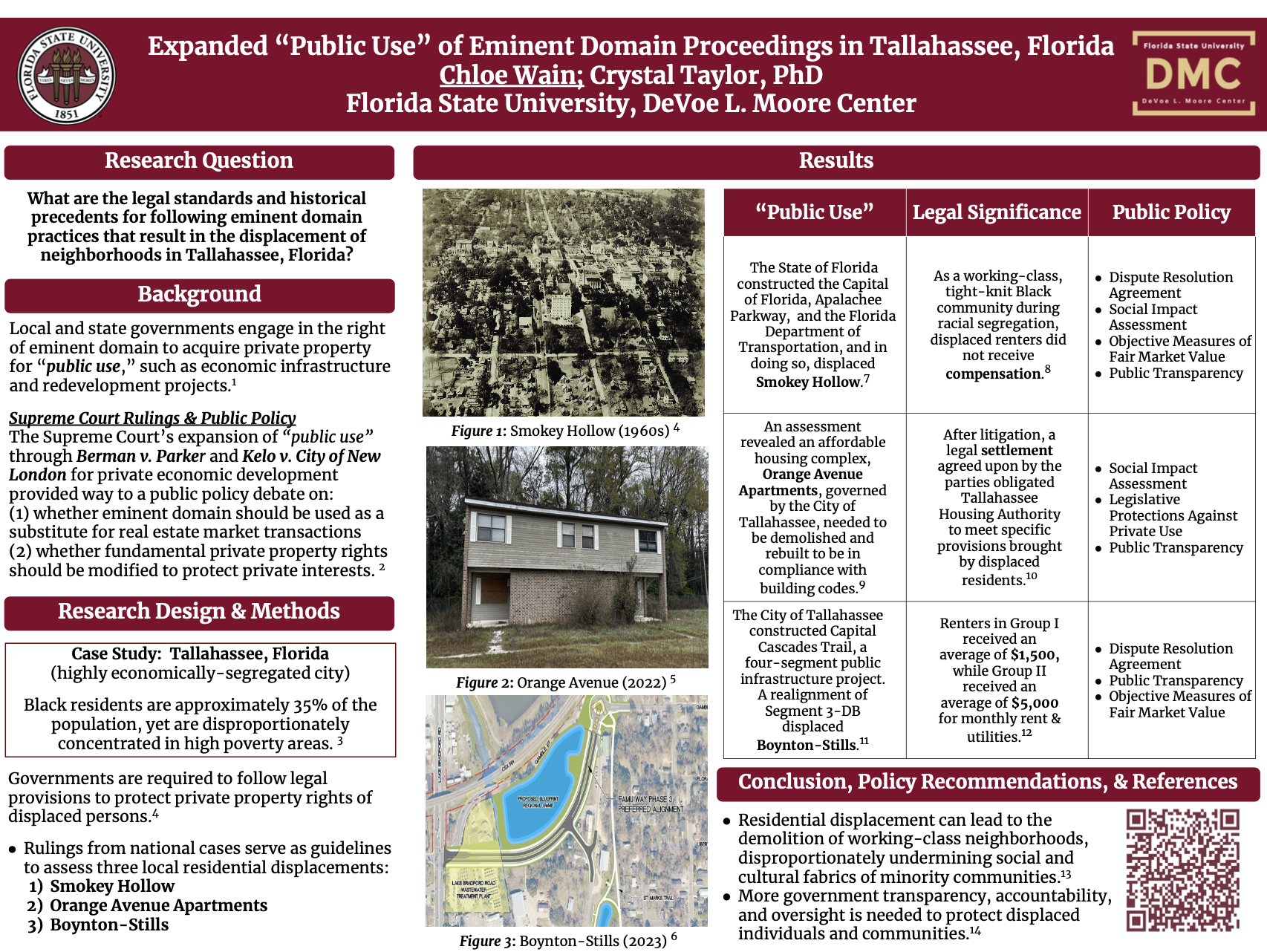Research Symposium
24th annual Undergraduate Research Symposium, April 3, 2024
Chloe Wain Poster Session 3: 1:30 pm - 2:30 pm /171

BIO
Chloe Wain is a senior in the Honors Program pursuing majors in Political Science, Editing, Writing, and Media, and Economics with a Humanities minor. She hopes to address criminal and human rights violations through a future public service career as a Public Defender. Chloe was chosen as Florida State University's Student Star, the Charles S. Billings Service Award, and the Humanitarian of the Year Award for the College of Social Sciences and Public Policy. With the DeVoe L. Moore Center, Chloe is writing an Honors in the Major Thesis about the City of Tallahassee’s usage of eminent domain through the displacement of working-class, Black neighborhoods. Chloe presented at the Johns Hopkins University Richard Macksey Humanities Symposium in March and will be presenting at the Association for Private Enterprise Education in Las Vegas in April. To develop a holistic approach to indigent representation, she has served as a Trial Intern Investigator with the Public Defender Services for the District of Columbia, an Investigative Intern at the Leon County Public Defender’s Office, and as a Legal Intern at do Campo & Thornton, P.A. in Miami. Chloe currently volunteers with the Center for the Advancement of Human Rights at the College of Law.
A Legal & Economic Analysis of the Expanded Definition of “Public Use” in Eminent Domain Proceedings in Tallahassee, Florida
Authors: Chloe Wain, Dr. Crystal TaylorStudent Major: Political Science, Editing, Writing, & Media, & Economics
Mentor: Dr. Crystal Taylor
Mentor's Department: The DeVoe L. Moore Center in the Department of Economics Mentor's College: College of Social Sciences & Public Policy Co-Presenters:
Abstract
Residential displacement resulting from large public infrastructure projects can lead to the demolition of close-knit, working-class neighborhoods. Such displacement often disproportionately undermines the social and cultural fabrics of historically Black communities. Local and state governments use the right of eminent domain to acquire private property for public purposes, such as infrastructure and economic development projects. Legal precedents show governments are required to follow constitutional, statutory, and regulatory provisions to protect private property rights through transparency, accountability, and oversight. The research evaluates the following: What are the legal standards, frameworks, and historical precedents for implementing eminent domain practices that result in the displacement of working-class neighborhoods in Tallahassee, Florida? The research compiles eight historical and contemporary legal case briefs to analyze and evaluate legal precedents set by eminent domain policies throughout the years. Five of the briefs are court cases that set legal precedents for constitutional, statutory, and regulatory provisions. Rulings are applied as guidelines to assess three local residential displacements, which occurred as a result of public infrastructure projects in the highly economically segregated city of Tallahassee, Florida. A preliminary legal analysis revealed that more local, state, and federal government transparency, accountability, and oversight is needed to execute measures and policies to protect persons displaced as a result of economic redevelopment projects. Potential public policy recommendations include the development of a dispute-resolution program, Social Impact Assessments, addressing tangible and measurable community benefits, and providing transparency of government procedures.
Keywords: Economics, Eminent Domain, Gentrification, Compensation, Displacement

